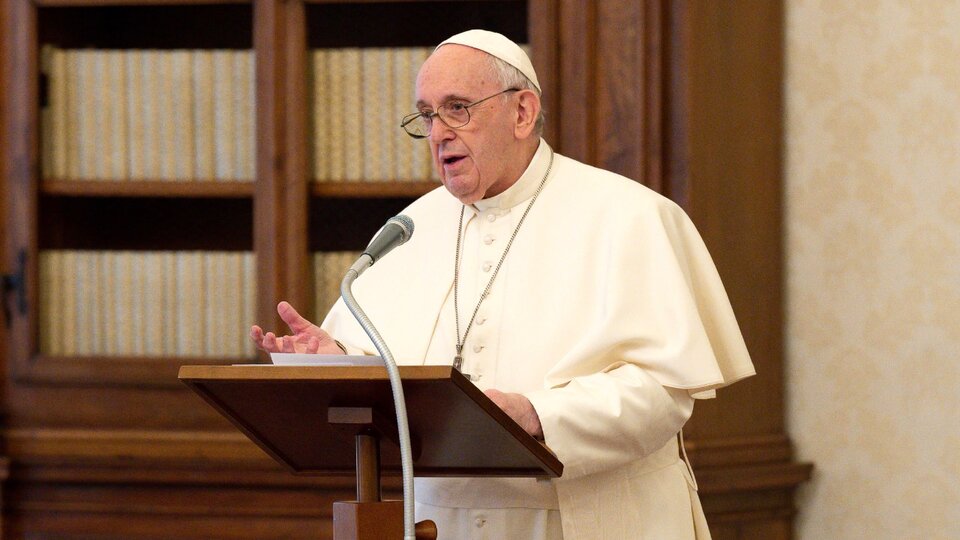
[ad_1]
Pope Francis has warned that it is necessary to always remember the Holocaust “because these things can happen again”. During the general audience held without the faithful due to the coronavirus, the Sovereign Pontiff recalled that Every January 27, the International Day of Remembrance of the Victims of the Holocaust is commemorated, a date which coincides with the liberation of the Nazi concentration camp Auschwitz in 1945, and warns: “Pay attention to how this road of death started”.
In tune with the Pope, UN Secretary General Antonio Guterres called for the unity of the international community in the face of “clear signs of a resurgence of anti-Semitism and Holocaust denial”, a phenomenon which finds a favorable ground with the crisis derived from the covid-19. For its part German Chancellor Angela Merkel, argued that the memory of the victims of Auschwitz is an “eternal responsibility” for present and future generations.
“Remembering is an expression of humanity”
“We commemorate the victims of the Shoah and all those who are persecuted and deported by the Nazi regime,” Pope Francis said. at the end of the general audience held in the library of the Apostolic Palace. “To remember is an expression of humanity, to remember is a sign of civilization. To remember is a condition for a better future of peace and fraternity”, declared the Supreme Pontiff.
Later he added: “To remember is to be careful because these things can happen again, starting with ideological proposals that want to save a people and end up destroying a people and humanity. Watch out for how this path of death, extermination, brutality began. “
Concerning the catechesis of the date, dedicated to the Bible, Francis asked that its reading “be accompanied by prayer” because “it cannot be read like a novel”. “It bothers me a bit when I hear Christians reciting Bible verses like parrots. But have you met the Lord with this verse? It’s not just a matter of memory but of the heart“, he concluded.
UN request and Merkel’s commitment
UN Secretary General Antonio GuterresHe said in a video intended to mark Holocaust Memorial Day that the coronavirus pandemic gave white supremacists and neo-nazis a new chance to attack minorities based on religion, race, ethnicity, nationality or sexual orientation. “The neo-Nazis and their ideas gain respectability”Guterres denounced during a virtual ceremony commemorating the liberation of the Auschwitz-Birkenau concentration camp by Soviet troops 76 years ago.
Guterres stressed that the context of the crisis caused by the coronavirus constitutes an opportunity for these extremist groups to disseminate their ideas. “Together, we must urgently unite our efforts against the danger they represent”, raised the Portuguese politician. “There is still no vaccine against anti-Semitism and xenophobia”, he alerted.
Guterres also recalled that one of the purposes of establishing the UN at the end of World War II was to end the discrimination and persecution that Jews and their communities suffered throughout the World War II. history. This goal, he regretted, cannot yet be achieved.
As Chancellor Angela Merkel reiterates Germany’s commitment to keep alive the memory of the crimes perpetrated on behalf of her country by the Nazi regime. Merkel thanked the survivors of these persecutions for continuing to bear witness to what they suffered, as it highlights “how vulnerable human dignity is and how easily human values can be violated”.
The Chancellor described the commemoration as a special sign of unity and determination. “We must resolutely oppose open and secret anti-Semitism, denial and relativization of the Holocaust”Asked Merkel. “At all times, we must be vigilant not to leave room for anti-Semitism and racism,” he added.
German Chancellor He especially thanked the survivors who came together and mustered the strength to tell their lives. “As contemporary witnesses, they convey the vulnerability of human dignity and the values that underpin peaceful coexistence,” he said.
Indeed, one of those who participated in the commemorative session organized by the International Alliance for the Remembrance of the Holocaust, the United Nations and Unesco was Irene Butter, a Jewish survivor of the Nazi concentration camp Born in Berlin in 1930. Butter tells how her family fled to Amsterdam in 1937 to escape the Nazis who had seized power in Germany since 1933.
However, with the invasion of German troops in Holland in 1940, Butter’s family was interned first in their host country and then in the Bergen-Belsen camp in Germany. The death of his father at the end of World War II added to the forced separation he suffered from his mother and brother, who had to be hospitalized, and with whom he was able to reunite 19 months later. in the American city of New York. .
.
[ad_2]
Source link
 Naaju Breaking News, Live Updates, Latest Headlines, Viral News, Top Stories, Trending Topics, Videos
Naaju Breaking News, Live Updates, Latest Headlines, Viral News, Top Stories, Trending Topics, Videos